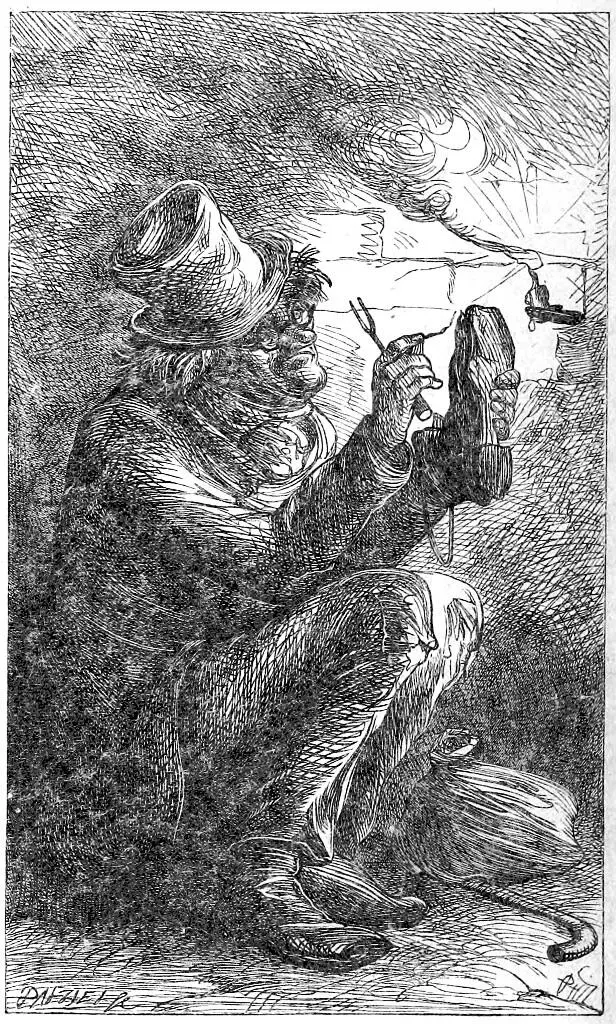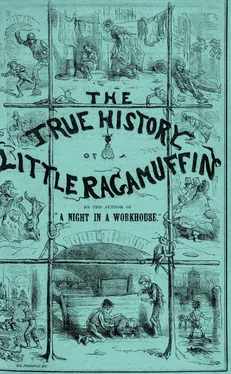“What part? Why, the ’spectable part. Don’t we, Ripston?” replied the youth who had been addressed as Mouldy.
“I should ha’ thought that he might have knowed that by our ’pearance, without arstin’,” observed Ripston.
“But is it near Covent Garden?” I asked.
“What, Common Garden Theayter?” answered Mouldy, cocking his cap and giving his side locks a twist in imitation of the habits of the aristocracy. “Oh, yes! It’s just a short ride in our broom from our house to the theayter; and Ripston and me goes whacks in a private box. Don’t we, Ripston?”
“What’s the use of tellin’ such jolly lies?” laughed Ripston. “Where we live is nigh Common Garden—both the market and the theayter. We lodges in the ’Delphi—that’s where we lodges. Where do you lodge, young un?”
It didn’t much matter where I lodged. No doubt I should be able to find a place near the market—perhaps in the market itself—where I might pass the night quite as comfortably as in Smithfield, to say nothing of the advantages of being shown my way and being on the spot in good time in the morning. Without hesitation, I jumped out of the pen and into the pathway where they were.
“Come on,” said I; “it’s getting late.”
“Where are you goin’, then?” asked Mouldy, in surprise.
“With you,” I boldly replied.
“But we’re a-goin’ to the ’Delphi, don’t I tell you!” said Mouldy.
“So am I.”
Mouldy whistled, and looked in astonishment at Ripston.
“What? ain’t your lodgin’a no nigher than the arches?” asked the latter.
“The ’Delphi, you said; you didn’t say anything about arches,” said I.
“Well, the ’Delphi is the arches, and the arches is the ’Delphi—ain’t they?” observed Ripston.
“Are they? Well, I didn’t know. How should I, when I never was there?”
“Never was there? Why, you just said that you lodged there.”
“Well,” said I, “if you must know the full particulars, I haven’t got no lodgin’s to go to.”
“No reglar lodgin’s, you mean.”
“No lodgin’s at all,” I replied, “only here,”—and I glanced round the pens.
“Oh, that’s all gammon, you know!” spoke Mouldy. “Every cove’s got a lodgin’! What have you done with your old lodgin’?”
What had I done with it? That was a question blunt as it was unexpected; and by the manner in which the two boys eyed me and each other, it was plain that they saw the confusion it occasioned me. Mouldy pursued his inquiries.
“If you hain’t got no lodgin’,” said he, “how do you get your wittles?”
“And where do you go of Sundays?” put in Ripston.
I had made up mind to conceal my affairs entirely from my new friends for the present, at least; and here, all of a sudden, I found myself cornered, without any chance of escape. But, after all, where was the danger? To all appearance, they were boys who got their own living, and took care of themselves, without anybody’s control. Perhaps it might be to my advantage to tell them how I was situated, or pretty nearly; they might be able to advise me how to set about getting work.
“If I tell you all about it, will you promise that you won’t split?” I asked.
Both the lads solemnly assured me that they would suffer death rather than be guilty of such baseness.
“Then,” said I, “I used to lodge at home. I lodged there last night.”
“What, along with your father and mother, and that?” asked Ripston.
“Yes.”
“And you’ve run away, and don’t mean to go back any more?”
“I’ll never go back again,” I answered, with great sincerity. “I daren’t go back.”
“I see,” said Mouldy, sagaciously nodding his head. “What was it that you nailed?”
“Nailed?”
“Ay! prigged, don’t you know? Did they ketch it on you, or did you get clean off with it?”
“What do you mean? Did they ketch what on me?”
“Well, that’s good!” laughed Mouldy. “How should I know what it was you stole? I wasn’t there, was I?”
“But I didn’t steal anything. It was because I was whacked so, that I ran away.”
The boys looked incredulous; and Mouldy laid his forefinger along the side of his nose, and winked impressively.
“So you ran away on’y because you was whacked, eh?” observed Ripston.
“Only! If you ever had any such weltings as I’ve been used to, you wouldn’t say ‘only.’”
“But did you get reg’lar wittles, and all that?” “Pretty fair.”
“And a reg’lar bed—reg’lar don’t you know, with sheets and blankets, and a bolster?”
“Why, of course,” I replied.
“Oh! of course, is it?” sneered Ripston; “and you wants us to believe that you gets all this—your wittles, and your bed with sheets to it—and just because you was whacked you run away and are afeard to go home again? You’re a jolly liar, that’s what you are.”
“Else a jolly fool, which is wuss,” spoke Mouldy, decidedly.
“You ain’t obliged to believe me; but what I’ve told you is all true,” was all I could say.
“Well, strange things does happen and so p’r’aps it is,” said Ripston; “but what I ses is this—a chap wot runs away from good wittles and comfor’ble lodgin’s just because he gets whacked, oughter to be kept out of ’em till he learns the walue of ’em.”
“I wish somebody would grub me, and give me a comfor’ble lodgin on them terms,” interposed Mouldy.
“They wouldn’t get much profit on yer, Mouldy,” grinned his companion; “but don’t you be afeard; he’s done something more’n he peaches to, only he won’t say, because he thinks we’ll split; and werry natural.”
Ripston was younger than Mouldy—two years younger, at least; but it was evident from his manner and speech that his worldly experience was very wide.
All the time this conversation had been going on, we had been scudding along at as brisk a pace as Mouldy’s slipslop boots would permit, up the Old Bailey and by Newgate, (where my companions having inquired whether I knew at which door they brought people out to hang ’em, and received from me an intimation that I did not, kindly paused for a moment to enlighten me,) out into Ludgate Street, and across the road into turnings and twistings dingier than any I had yet met with. Had it been daylight, the effect of perambulating such narrow, gloomy courts and alleys would have had anything but an enlivening effect on one’s spirits; but, instead of daylight, it was pitchy dark; and when I reflected that every step I took carried me farther away from home—from that home which, miserable and cruel as it had been to me, my companions, who might be regarded as competent judges in such matters, had declared that I was a jolly fool for leaving,—I began to be filled with remorse, and tears forced themselves into my eyes. Had I been compelled to talk, I should undoubtedly have betrayed my emotion; but, as luck—good or bad—would have it, my companions had settled down to silence; indeed, the shuffling trot had begun to tell on them, leaving them no spare breath for conversation. So we sped along, I keeping a little in the rear, till at last we suddenly emerged from the dingy alleys and turned into the wide, gas-lit Strand.
Chapter XIII. The Dark Arches and the inhabitants there, I witness a lark, as performed by them. My first night’s lodging in a van.

It’s old Daddy Riddle
Late as it was—nearly eleven o’clock—there was plenty of noise and bustle, and so many people about, that it was as much as we could do to keep up the trot without danger of being knocked over, or at least of having our toes trod on.
Читать дальше












